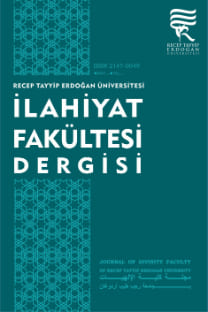Hz. Peygamberin Sünnetinde Şefkat
Bu tezin konusu; ‘Hz. Peygamber’in Sünnetinde Şefkat’tir. Araştırma giriş ve dört bölümden oluşmaktadır. Girişte çalışmanın amacı ve yöntemi belirtildi. Birinci bölümde “şefkat” kavramının anlam alanı incelendi. Şefkatin anlamdan eyleme dönüşü izah edildi. Şefkate müteradif ve zıt kavramlar ortaya konarak kavramın anlamı netleştirildi İkinci bölümde şefkatin işlevi üzerinde duruldu. Evrenin düzeni ve devamında, hayvanların yaşamlarında, şefkatin fonksiyonu irdelendi. İnsanın; ferdî, ailevî ve içtimâî hayatında şefkatin rolü açıklandı. Üçüncü bölümde Hz. Peygamber’in şefkatle yetişme süreci izlendi. Risalet öncesinde ve sonrasında Hz. Peygamber’in şefkatinin beslendiği kaynaklara işaret edildi. Dördüncü bölümde Allah Rasûlü’nün şefkatinin yansımaları olarak; çocuklara, kadınlara, yaşlılara, yetimlere, engellilere, fakirlere, hastalara, borçlulara, esirlere, kölelere, çevreye ve hayvanlara şefkati anlatıldı.
Compassion in Prophet's Sunna
The subject of this study is “Compassion in Hz. Prophet’s Sunna. The study consists of an introduction and four chapters.In the introduction, the aim and the method of the study has been stated. In the first chapter, the semantic field of the “compassion” concept has been examined. The conversion of compassion from meaning into action has been explained. The concept has been clarified by expressing its synonymous and antonymous terms. In the second chapter, the function of compassion has been put emphasis on. In the order and the continuation of the Universe and in lives of animals, the function of compassion has been scrutinized. In man’s individual, family and social life, the role of compassion has been represented. In the third chapter, Hz. Prophet’s upbringing process has been observed. After and before Hz. Muhammed (s.a.v.) was a prophet, the sources which Hz. Prophet’s compassion fed have been indicated. In the fourth chapter, as the reflections of his compassion, the compassion for children, women, old people, orphans, the disabled, the poor, the ill, debtors, captives, slaves, environment and animals have been mentioned.
Keywords:
Compassion, Gentleness, Mercy, Sunna, Hadit,
___
- Yok
- Yayın Aralığı: 2
- Yayıncı: Recep Tayyip Erdoğan Üniversitesi İlahiyat Fakültesi
Sayıdaki Diğer Makaleler
İslâm Ahlâk Esasları ve Felsefesi
Ebussuud Efendi’nin İrşâdü’l-Akli’s-Selîm Adlı Tefsirinde Kıraat Olgusu
Hissi Mucize Olarak Hz. Peygamber’e İsnad Edilen İnşikâku’l-Kamer Hadisesine Farklı Bir Yaklaşım
Ulûmu'l-Kur’ân’la İlgili İlimlerin Tasnifi
Şayegan, Daryuş. Din Devrimi Nedir?
